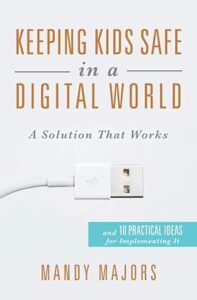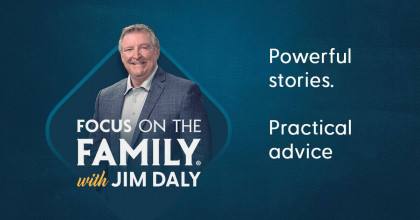MANDY MAJORS: You know, if your Snap streaks die tomorrow, are you gonna have a meltdown? That should be a red flag in your teenager’s mind that it’s becoming an idol. You know, we talk about that a lot in our home. Um, those core things about the, the bedrooms, the bathrooms, and mealtime, when you’re with grandparents that you see for two minutes, are you on your screen? Are you talking to your grandparents? You know, core things like that and maintaining that healthy balance, I think is so important.
JOHN FULLER: Well, that’s Mandy and she’s with us today on Focus on the Family with Jim Daly, offering insights and guidance for how to manage technology and screen habits with your family. Thanks for joining us. I’m John.
JIM DALY: You know, John, it’s not an overstatement. We hear from parents on this topic of screen, screen management every day.
JOHN: Mm-hmm.
JIM: Parents are calling us by the 100s saying, “What can we do to better manage our kids’ screen time?” And there are some great, uh, ideas and I sai- I’ve said this many times, you know, one of the experts, uh, that we had here said, “Delay phones as long as you can.” And so I remember the boys (laughs) would say, “You know, dad, when do we get a phone?” I’d say, “Oh, lemme talk to mom.” And six months later, “Did you talk to mom yet?” “Oh, you know, I need, you know, I need to talk to mom and we’ll see.” Well, we delayed that for years. I think Trent was 17-
JOHN: Mm-hmm.
JIM: … and Troy was 15, and they were good with it. They kinda caught on after a while that we were gonna wait until they needed ’em for driving-
JOHN: Mm-hmm.
JIM: … and things like that. But this is a big issue, and parents are desperate to say, help us with managing this.
JOHN: Mm-hmm.
JIM: And I’m looking forward to talking today with Mandy Majora about how to manage this area of our kids’ development, and frankly our own-
JOHN: Mm-hmm.
JIM: … if we’re honest about it-
JOHN: Yeah.
JIM: … uh, how do we manage this for the family?
JOHN: Yeah. It, we’re all affected by the screen. And, uh-
JIM: Right.
JOHN: … so to that end, I think we parents will get some tips along the way as well.
JIM: Yeah, that’s good.
JOHN: Mandy Majors, uh, has two young adult children and is the founder of NextTalk, a nonprofit organization to help kids stay safe online by creating a culture of conversation within families and churches and schools. And, uh, she’s written a terrific book called Keeping Kids Safe in a Digital World: A Solution That Works and 10 Practical Ideas for Implementing It. And you can learn more about Mandy, her, uh, ministry and this book, uh, when you stop by FocusontheFamily.com/broadcast.
JIM: Mandy, welcome, uh, to Focus on the Family for the first time.
MANDY: Thank you so much for having me.
JIM: So, you heard my little setup there. This is kind of the pain point for most parents. It’s, and the way we manage it generally is we just close our eyes to it, at seven, eight, nine, we give ’em the tablet, we maybe even give ’em a phone, a smartphone, and we just, you know, they gotta get used to it. Uh, then the other extreme is batten down the hatches. You’re never gonna see the light of day when it comes to a screen until you’re 21, that kind of two extremes and then everything in the middle. Why do you think it’s such a pain point, I guess, uh, for us, particularly as Christian parents?
MANDY: Well, we’re trying to figure it out. It’s a new territory that we’re in. I found myself when my daughter was nine, she came home and she asked me a very highly sexualized question. She didn’t have a phone. And I thought, in my Christian brain, if I don’t give her a phone, I don’t have to talk about all the online stuff.
JIM: Yeah, that’s interesting, yeah.
MANDY: And that was my moment that I looked at my husband and said, “We’re missing something in the church and in our Christian home, we’re missing something,” because she’s exposed even without technology.
JIM: Yeah. So, you and your husband initially said no to technology. How did that work for you?
MANDY: Well, she kept getting exposed to things.
JIM: (laughs) Okay.
MANDY: Right? She would come home and tell me about, ask me questions. And I remember one night my husband, he was like, “Let’s just get outta here. Let’s move somewhere where there’s no Wi-Fi. We grow our own (laughs) vegetables. You know?
JIM: Yeah. (laughs)
JOHN: (laughs)
MANDY: And that’s what you feel like, ’cause their innocence is-
JIM: That’s so true.
MANDY: … being stolen.
JIM: Yeah.
MANDY: And um, every night we would just pray about like, how are we gonna parent this? I mean, this was 11 years ago, so nobody was talking about it as much back then. And I remember one night we were praying, and he grabbed my hand and he was like, “We can’t say no to all technology. Like, this is the world they’re growing up in, and I think what we need to do is teach them how to use technology like we’re gonna teach them how to drive.”
JIM: Yeah, that’s good.
MANDY: And when he said that I was like, “Well, what do you mean by that?” And he said, “We’re not gonna start out going 70 miles an hour down the highway. We’re gonna, it’s gonna be a step-by-step process. I’m gonna start with them in the driveway, and we probably won’t leave the first time.” And that intrigued me and I was like, “Okay, maybe we could do that. Maybe we (laughs) could create this experiment in our home where we’re walking our kids through a step-by-step process on how to use technology safely.
JIM: And I, I like the idea, it’s almost, we often talk about inoculation. You know, it’s not that we’re gonna keep them from it.
MANDY: Yes.
JIM: It’s helping them to decide how to manage it, right, how to not look at something as best as possible, and how to control those appetites, et cetera. But it has to come with a lot of fear. I mean, because on the one hand we’re acknowledging there’s no impenetrable way, no fortress we could create. I think for a lot of moms and dads that’s disheartening. Like, wow, it’s made this battle even harder.
JOHN: Mm-hmm.
MANDY: It was scary at first, and that’s one of my points. Like, I had to process that, me and Jesus and my (laughs) husband. I had to process the fear, but also, like, her being exposed without technology, it just created this awareness in me that not giving her a phone till she was 30 that didn’t keep her safe. So I had to dig deep and figure out what is the solution, and how are we gonna tackle this in our home?
JIM: But yeah, you know, so much of the, of, yeah, whether it’s YouTube, or I mean, I look up on YouTube how to get a fix-it solution to a home problem-
JOHN: Mm-hmm.
JIM: … you know, whatever it might be. Um, so there’s a lot of good that comes with it. But what is lurking out there for the parents that aren’t aware? What are some of the things that kids can be exposed to, uh, in those same good tools where bad things are happening?
JOHN: Hm.
MANDY: Well, we’re teaching kids watch on a screen and then emulate.
JIM: Mm-hmm.
MANDY: Right? Our washer breaks and we pull out the iPad, and do everything the person tells us to do to save $800, right-
JIM: Right, totally.
MANDY: … ’cause we’re trying to fix it. So they’re watching that in us, and oftentimes they are watching and emulating something bad-
JIM: Mm-hmm.
MANDY: … and then we’re getting mad at them. And instead, I think we need to tweak our thinking. There’s a thought process that happens between the watch and the behavior, but are we teaching that? And I wasn’t.
The other thing too, with YouTube, like, it’s evolved since I’ve been in this over a decade. Uh, you know, now I actually consider YouTube a social media platform because if you think about it, there’s YouTube shorts. So you’re scrolling just like TikTok, and you can comment, you can interact with strangers. So I know a lot of parents don’t think of that as social media, but it actually is.
JIM: Yeah.
MANDY: And, um, and so we always have to be constantly evolving with the apps because they’re updating and changing, and we need to be staying, um, updated on that.
JOHN: Mm-hmm.
JIM: Yeah. And again, back to how to teach them to manage this. Um, do you always get a win, or do you get some losses?
MANDY: Well, I think the biggest thing is, you know, I know I will crawl in bed with my husband at night and sometimes he will say to me, “Mandy, can you put your phone away?” You know, I’m, we’re constantly connected to work-
JIM: (laughs)
JOHN: Mm-hmm, yeah, right. (laughs)
MANDY: … to friends and, you know, we struggle with this.
JIM: Mm-hmm.
MANDY: But we hand our kid a phone at 16, and we expect them to have it perfectly figured out. And so I say, you know, look in the mirror parents, if we are struggling to have the healthy balance, they are going to struggle. So we have to be the model here, and this is where we have to look in the mirror and admit when we’re not good with our phones.
JOHN: Mm-hmm, mm-hmm.
JIM: When you describe healthy balance, uh, you know, that’s, boy that’s so subjective. And I can see people, parents who are talking to friends on the other side of the country or whatever it might be, highly justifiable. Mandy, I’m staying connected to my relatives and to my friends. I mean, you need to control those appetites.
JOHN: Mm-hmm.
JIM: It’s what you’re saying ’cause you are being an example to the kids around the table.
MANDY: Yeah, that’s true. I would say one of the things is to be very clear about your boundaries and expectations from early on. So a couple of things that I found really worked in our home is no phones and bedrooms at night, no phones at meals, no phones behind closed doors.
JOHN: That’s good.
MANDY: Those sorts of things.
JOHN: Mm-hmm.
MANDY: And then if you start that when they’re four with a family iPad, when they get a phone at 15 and 16, like, it’s just standard operating procedure that I don’t have a screen in my bed at night.
JOHN: Mm-hmm.
JIM: Yeah.
MANDY: And so starting that early, and a lot of times we think parenting a phone is when they get a phone. Parenting a phone starts at four years old.
JIM: Mm-hmm.
JOHN: Before the phone?
MANDY: Yeah, before. You are laying guidelines in place for your children to make sure they have that healthy balance.
JOHN: You know, Mandy, I’m thinking there might be some parental hesitation, uh, to even talk about all this with their children because they don’t have a handle on what you were just describing a moment ago about controlling their own appetite, Jim, as you put it. So what’s the grace moment there, or how do they get unstuck in that?
MANDY: Yeah, I think this is the moment that you have to look in the mirror and really be honest with Jesus and you, and, and that is what is gonna make this work in your home. And apologize to your kids when you get it wrong, when you get it wrong. You know, when they’re trying to tell you a story and you’re on your phone and they’re like, “Are you even listening to me?” And it’s very easy to be like, “I’m responding to a work text. Can you give me a minute?”
JIM: You know, ironically, I would say I did that far better with the boys than I did with Jean.
JOHN: Uh-huh.
JIM: I would tend to engage the phone with Jean ’cause I can do two things at once. (laughs)
JOHN: He really can by the way. (laughs)
JIM: (laughs)
MANDY: Okay.
JIM: But- It didn’t give her my full attention.
JOHN: Yeah,
JIM: But I think ironically with the boys, I think I’d set it down to make sure I was that example-
JOHN: Mm-hmm.
JIM: … but not with my spouse.
JOHN: Yeah.
MANDY: Yeah. Well, may-
JIM: So, you gotta look at all areas.
MANDY: Absolutely.
JOHN: Yeah.
MANDY: Absolutely. Well, and I think too, we need to look past the phone. I mean, yes, technology has created a lot of questions on how we’re gonna handle this, but when I was on this journey trying to figure out, like, what is the solution to keep my kids safe, you know, I kind of went through ’em all. First of all, okay, not giving her a phone ’til she was 30, that didn’t keep her safe. So, that’s off the list.
JIM: (laughs)
MANDY: I’m not gonna be that hyper.
JIM: But I liked the goal.
MANDY: Yes, yes.
JOHN: (laughs)
MANDY: And I believe in delaying for sure-
JIM: (laughs)
MANDY: … for sure.
JOHN: Yeah.
MANDY: But also, like, once she earned a phone, it was almost like all I wanted to do was have an app that mirrored her phone where I could check everything.
JOHN: Mm-hmm.
MANDY: And I’m a advocate for being in your kid’s phone. Absolutely have the passwords, do random phone checks, you know, be engaged in their online world. But the real solution that I think God gave me is, you know, restrictions are great, use them, but it’s really about the relationship.
JIM: Mm-hmm. Well, and also emancipating them. That’s a word we’ve used here, uh, with Dr. Ken Wilgus.
JOHN: Yeah.
JIM: You know, you’re trying to emancipate your children into adulthood, so you need to teach them what is good and what is healthy and what is unhealthy. That just takes a lot of effort.
MANDY: It’s hard work.
JIM: It’s hard work.
MANDY: And I think that’s why a lot of parents don’t wanna do it.
JIM: Mm-hmm.
MANDY: Honestly, it’s why I didn’t (laughs) wanna do it.
JIM: Yeah, no.
MANDY: I wanted to get an app to monitor everything and send me reports. And those things are great, they’re great tools, but you can’t do that and take your hands off the wheel and be like, “Okay, we’re done-”
JIM: Yeah.
MANDY: “… I don’t have to do anything else with technology.”
JIM: Well if you think about it, it’s a lot like church.
MANDY: Mm-hmm.
JIM: We allow church to teach our kids. You know, they’re gonna get that at Sunday school, so I don’t have to be overly engaged there in doing a devotional with the kids and all that. That is so far from the truth, right? You should be the core and they, the church should be giving you the, uh, you know, the additional supplemental content, uh-
MANDY: The support.
JIM: … the same thing here. Let me ask you this, uh, gaming apps, some of the dangers of online stuff, uh, people out there don’t always have the right, uh, desires for that relationship with your child. You know, you got strange people out there looking to groom your child for their own darkness, but speak to those.
MANDY: Yeah. So I mean, I grew up in the generation of, you know, my mom telling me, don’t get in the car with the guy offering you candy, you know-
JIM: Yeah.
MANDY: … stranger danger.
JIM: Right.
MANDY: Of course, we still have to worry about our kids being kidnapped, absolutely. But now, that has shifted because of technology.
JIM: Mm-hmm.
MANDY: Now, your kids can be next to you-
JIM: Mm-hmm.
MANDY: … on the family sofa-
JIM: Yeah.
MANDY: … playing Roblox with who they think is an eight-year-old kid. But it’s actually a 72-year-old sex trafficking pimp building a relationship with your kid-
JIM: Mm-hmm.
JOHN: Uh-huh.
MANDY: … in your home. So the strangers are coming into our homes through the Xbox, through the PlayStation, and they are creating relationships with our children. And we need to bring awareness to that. We need to educate ourselves on that, and make sure our kids know of the red flags of what to look for.
JIM: Mm-hmm.
JOHN: Really good.
JIM: Yeah. There’s so much, there’s so many contours to know. Um, lemme just jump in and say, this is Focus on the Family with Jim Daly, and our guest today is Mandy Majors, and we’re talking about her journey. And, uh, she captured her journey and her perspectives in this terrific little book called, Keeping Kids Safe in a Digital World: A Solution That Works, and 10 practical Ideas for Implementing It. And, uh, I’ll encourage you to get a copy from us here at the ministry. We’ve got the details at FocusontheFamily.com/broadcast.
JIM: Mandy, you and your husband finally decided to get a phone for your daughter. Now, your daughter’s out in the audience-
JOHN: (laughs)
JIM: … so we may have to bring her in here in a minute.
MANDY: (laughs)
JIM: But, uh, how did you do, how did you navigate that, and was it kinda learn as you go?
MANDY: Well, it was, but a couple of key things we did was she earned it. And when I say earned, I mean, I would look for things. Normally kids play devices before they get a phone, a family iPad-
JIM: Mm-hmm.
MANDY: … or even your own phone.
JIM: Mm-hmm.
MANDY: They’re communicating with their friends on your phone. And so what I would look for is when something, an inappropriate word would pop up on an app or something that she knew was not okay, that she would confide in me when she was playing my phone. And when she would do that, those were key indicators to me that she could be safe online, because she was talking to me and reporting it to me. And, um, she earned a phone. And I will say too, no social media at first. So many times we, you know, a kid is gifted a phone, and they open it up and it’s a free for all, that’s going 70 miles an hour down the freeway.
JIM: Right.
MANDY: It is earn one social media platform at a time, and I would say the first couple months there’s no social media. And so you earn it step by step and you get on the same platform, and you learn it with them. And I know some parents are like, “I hate social media. I’m not gonna do it.” Listen, your kids will show you how to use it.
JIM: Mm-hmm.
MANDY: They are so brilliant.
JOHN: (laughs) Um, they’re very good at it.
JIM: Yeah. (laughs).
MANDY: They know, they love to teach us new things. But, you know, say, “How does this work? How do you DM?” You know, that’s a direct message. Have your kids teach you in this world too, so that you’re involved with them.
JIM: Yeah, and this is so good. I want to get into the solutions ’cause you give parents 10 ideas on how to create a culture of conversation, which I think is brilliant, uh, in your home. And let’s walk through those. Uh, maybe if you wanna list them or you want to hit a couple of ’em, and of course people to get all 10 just get a copy of the book.
JOHN: Mm-hmm.
JIM: And John will give you those details in a minute but go ahead and hit what you think would be most helpful.
MANDY: Yeah. So I think one of them that’s really, really important is when my daughter, she earned a phone. She didn’t have social media at first, and then she earned her first social media platform. So we were walking through that and, um, I was learning it and there were certainly moments of, “Uh-oh, we’ve messed up. We shouldn’t have done this.” You know, I mean, it was a true experiment. But I would wake up every day and just pray, “Lord, don’t let me miss the teachable moments.”
JIM: Mm-hmm.
MANDY: “Let me be intentional. Anything that she says to me, you know, awaken me to that, so I can speak into it.” And one day, she turned the corner with her phone in her hand, and I knew with the look on her face it was gonna be a moment. And she said, “Mom, I’m scrolling through Instagram, and our friends from church went to a wedding and it was a beautiful wedding. And they, they posted it, and it said #wedding.” And she said, “I clicked that because I wanted to see pretty dresses.” And she said, “Mom, this popped up.”
In that moment, old Mandy literally would’ve been like, “I tried to be cool Insta mom, but we are done. That is of Satan, and we’re done. I’m throwing it away. Turn, I’m deleting the app,” That’s what old Mandy would’ve done. New Mandy and Matt (laughs) when I told him this story he’s like, “There’s no way you responded that way.” I’m like, “Yes I did.”
JIM: (laughs)
MANDY: (laughs) He was, like, “That was Jesus.”
JIM: (laughs)
MANDY: But, new Mandy, this is what new Mandy did. New Mandy takes the phone, puts it face down, and I look at my daughter and I say, “I am so proud of you.”
JIM: Mm-hmm.
MANDY: “You saw something that made you feel like, ‘Oh, this is not normal,’ and you could have kept clicking, but instead you took that captive, you didn’t go down that rabbit trail, and you trusted me with it.”
JIM: Mm-hmm.
MANDY: “So because you trusted me, you get a new app today.”
JIM: Wow.
MANDY: Now, her eyes lit up and that was an experiment, so I had to roll it back a bit.
JIM: Okay.
MANDY: I said, “Okay. Not, It has to be a mommy approved app-”
JIM: Yeah, yeah, yeah, not any app.
MANDY: “… because this is not a free-for-all. It’s not a free-for-all.”
JIM: No, but I like the concept of that.
MANDY: Well, well I didn’t know what I was doing in the moment.
JIM: Yeah. (laughs)
MANDY: I didn’t know what I was doing, but I phrase it in my book as one, avoid crazy parent mode.
JIM: Yeah.
MANDY: Don’t be me.
JIM: Yeah.
MANDY: Don’t throw away the app or take away the phone when they confide in you because listen, all these years later, now I’m looking back on that moment. What that does is it creates an environment when your kid is exposed to something-
JIM: Mm-hmm.
MANDY: … they are gonna hide it from you because they don’t wanna lose their device or lose the app. And that is creating a space where Satan is speaking harm into our children-
JIM: Yeah.
MANDY: … and they can’t confide in us. Instead of switching to, “Thank you so much for telling me.”
JIM: Yeah.
MANDY: And what was even cooler in that moment that night, I crawled in bed with my daughter and I said, “I’m having trouble getting those images outta my mind. Are you okay? Are you okay?”
JIM: Mm-hmm, mm-hmm.
MANDY: And you guys-
JIM: It’s so honest, yeah.
MANDY: … I mean, that’s Deuteronomy 6:6-7, right?
JIM: Yeah, yeah.
MANDY: Talk when you’re going to bed.
JIM: Yeah.
MANDY: Like, God knows what He’s doing. And that night was so cool because we talked about, I looked at her, I mean, you know, we were laying there in bed, but I said to her, “Honey, when you see things like that, you’re gonna go to school tomorrow and you’re gonna see people differently, and I don’t want that for you. Like, I want you to protect your heart and mind.”
JIM: Yeah.
MANDY: And, and also I said, “We’re more than objects. Like, we’ve got skills and talents, and we’re more than body parts.”
JIM: Yeah.
MANDY: “And so, you know, you’re gonna have to make a decision. This is readily available for your generation, and I want you to understand why it’s not good for your heart and mind.”
JIM: No, it’s so good, and I think that avoiding of crazy parent mode is probably the toughest thing to do ’cause you’re reacting in the moment, and it’s even touching our core fears ourselves, right, of our own. So we react and then we get, then you’re gonna have to clean up on aisle one on that-
MANDY: (laughs)
JIM: … and then move to the object lesson.
MANDY: Well-
JIM: That’s critical.
MANDY: … absolutely. Well, and I would say for any parent out there who are like, “Oh, I threw away the iPad last night-”
JIM: (laughs) Yeah.
MANDY: “(laughs) … when they showed me something on Roblox.”
JIM: I boiled it in water.
MANDY: Yes. I wanna encourage you ’cause I’ve had to do this myself, so I know what this looks like, go back and apologize to your kid. And it goes like this, “I am so sorry that I yelled at you. I was not mad at you at all. In fact, you did everything right.”
JIM: Right.
MANDY: “Something bad popped up, and you showed it to me. You did everything right, and that’s what I want you to keep doing. I’m sorry that I yelled. I’m mad because that shouldn’t be on a kid’s app-”
JIM: Mm-hmm.
MANDY: “… that you live in a world that that shouldn’t be on a kid’s app. And I’m mad about that, but I’m not mad at you.”
JIM: Yeah.
MANDY: “So if you keep-”
JIM: That’s really good.
MANDY: “If you keep confiding in me, you and I are working together to keep you safe from all that.”
JIM: Yeah.
MANDY: That way it creates a team environment. You and your kid are working together to protect them from harm.
JIM: Yeah, that’s good.
MANDY: Yeah.
JIM: Describe the, what family screen guidelines should look like. I mean, everybody’s struggling with this one.
JOHN: Mm-hmm.
JIM: Don’t have ’em? Have at 14, 20. Uh, what is a good family screen policy?
MANDY: Well, is it becoming an idol? Like, that’s what you have to ask yourself. Can you live without it? You know, if your Snap streaks die tomorrow, are you gonna have a meltdown? That should be a red flag in your teenager’s mind-
JIM: Yeah. (laughs)
MANDY: … that it’s becoming an idol. You know, we talk about that a lot in our home. Um, those core things about the, the bedrooms, the bathrooms, at mealtime, when you’re with grandparents that you see for two minutes, are you on your screen? Are you talking to your grandparents? You know, core things like that, maintaining that healthy balance I think is so important.
JOHN: Mm-hmm.
JIM: Really good. Mandy, right at the end here, speak to the mom or dad who has given in and really cast it away. You know, everybody’s gonna deal with this, you’re gonna deal with this, you’ll figure it out, kind of a hands-off approach. And they’re hearing this going, “Uh-oh. Uh, yeah, what do I do now?”
JOHN: Mm-hmm.
MANDY: Yeah. Well, first of all, what I would say is give yourself some grace.
JIM: Mm-hmm.
MANDY: Like, we’re all learning how to parent this in real time, so that’s the first thing. The second thing is, I would not go in guns blazing and say, “I heard this podcast. No phones in bedrooms. (laughs) No phones in bathrooms.” Because here’s the thing, your kids are gonna hate you for that, and I don’t want that. I want, I don’t want there to be a breakdown in relationship.
I think what you could do is have a real sincere conversation with your children and say, “I think I messed up. I gave you your phone. You have it at night. I set no boundaries. Have you been exposed?” And say the big words, because your kid has a phone. You need to say those words with your kids.
JIM: Yeah.
MANDY: Say the big things if your kid has a phone and, and, and own your part.
JIM: Mm-hmm.
MANDY: I messed up. I should have created some boundaries. I should have warned you that there’s dangers on that and I just didn’t know, and I’m really sorry. S-
JIM: Think of the power of that as a parent, uh, kind of fessing up-
JOHN: Mm-hmm.
JIM: … that I blew it. I was looking the other way.
MANDY: So, can we have a reset? You know, can we have a reset? And I always tell parents, like, the number one thing that I would want you to do and move towards is getting the phones outta bedrooms at night, that’s critical. So maybe just having a conversation with them is, you know, one of the things I’ve learned is online predators target kids at night and they DM, and they act like they’re your friend and they’re not. And they get you into weird situations and kids have literally been lost by suicide, because of sextortion schemes like this.
JIM: Yeah.
MANDY: So talk with them about that and explain the why behind it. And then also, like, just the science. You need eight hours of sleep.
JIM: Right.
MANDY: You’re gonna be a better athlete tomorrow. You’re gonna be a better person tomorrow, you know, recognizing that.
JIM: Absolutely. It strikes me that, um, you know, even every area of your life, I think of this in managing here at Focus on the Family, up on the table, get everything into the light. If we’ve made a mistake, let’s talk about it so we can correct it. The same i- i- is true for parenting. Okay. I’ve made a mistake, I wanna get this up on the table. It’s a great demonstration for your children to see you doing that, and it allows them a mechanism to say the same thing.
MANDY: Bring it into the light.
JIM: Bring it into the light, always.
MANDY: That’s one of the things we say all the time.
JIM: Yeah.
MANDY: And, and I also wanna say parents, Christian parents, if you found something on your kid’s phone and you’re just disappointed, listen, if we have not talked to them about that, we’re partly to blame.
JIM: Yeah.
MANDY: And, we have to own that. We, and I’m not, that’s not going to be a scapegoat to your kids. But what I have found working with these families is sometimes if parents will fess up, then eventually the kids will be like, “Yeah, I should have known better.”
JIM: Yeah.
MANDY: And they’ll own their part, and then we can come together and heal together as a team.
JIM: Well, that’s so good. Let me turn to our listener. I hope you know Focus on the Family is here for you. We have a dedicated team, our Plugged-In team, who has their finger on the pulse of all things technology related. They review all kinds of entertainment to help you as a parent determine what’s best for your family when it comes to movies, games, music, and so much more. I wanna encourage you to check that out.
We also have the terrific book by Mandy Majors, Keeping Kids Safe in a Digital World: A Solution that Works, which is full of insight on ways to develop a healthy relationship first with your kids, then with technology. And we’d like to send you that, uh, for a donation of any amount today, and no amount’s too small. $5 is fine. When you contribute to the work we do here at Focus on the Family, you’re helping people like Meghan who wrote to tell us this.
“I’ve listened to Focus on the Family every day, but this is the first time I’ve ever called. My husband and I have been struggling, and I couldn’t move forward without really understanding what went wrong, not just for us, but for our kids too. Talking with your team today gave me so much clarity and hope. Thank you so much for helping me see that our family can heal.”
JOHN: Oh, that’s a wonderful story.
JIM: It is.
JOHN: Mm-hmm.
JIM: And it happens in literally 100s of 1000s of times each year. And here at Focus on the Family, we’re committed to helping families not just survive, but to thrive in Christ. But, that’s only possible with support from friends like you. This Christmas season is the perfect time to deliver hope and joy to families in crisis. Through your support of Focus on the Family, you can continue to provide that much needed help to folks like Meghan when you do ministry, your ministry through Focus on the Family. So, please donate today.
JOHN: Yeah. And right now, your year-end gift is going to be doubled dollar for dollar through a special match opportunity. And God’s going to use your donation to bring healing and redemption and hope to twice the families. So donate, and, uh, get your copy of Mandy Major’s book, Keeping Kids Safe in a Digital World when you call 800 the letter A and the Word FAMILY; 800-232-6459. Or online, you can donate and request the book at FocusontheFamily.com/broadcast.
Well, next time we’re gonna hear from Pastor Gary Thomas, who has some insights and thoughts on how to rediscover God’s love, joy, and peace.
GARY THOMAS: And I found Satan as a father of lies, will try to sew these lies into our soul to create bitterness and frustration with God. He, he doesn’t care what lie we believe. He cares that the lie will separate us from seeing God’s goodness-
JOHN: Mm-hmm.
GARY T: … God’s grace, God’s mercy, God’s truth, that God’s way is best.
JOHN: Thanks for listening to Focus on the Family with Jim Daly. I’m John Fuller, inviting you back as we once again as we help you and your family thrive in Christ.

















